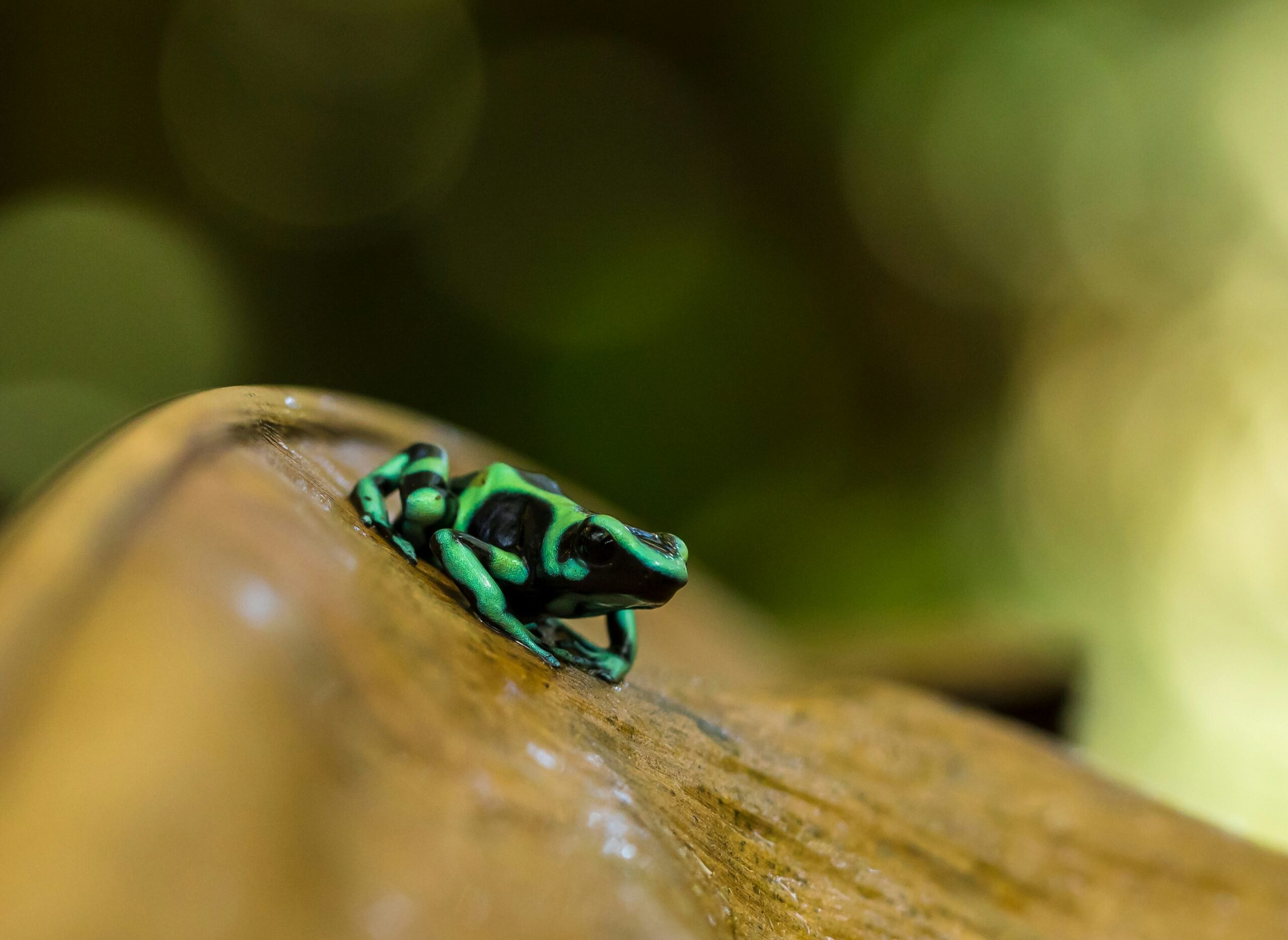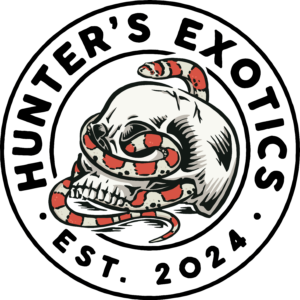Species Overview
Dendrobates auratus, commonly known as the Reticulated Poison Dart Frog, is a vibrant and striking amphibian native to Central and South America. Known for their bold black and green or blue patterns, these frogs are active, alert, and popular among dart frog enthusiasts. They thrive in well-planted, humid environments and require a balanced diet to maintain their bright coloration and health.
Fun Facts
Their skin contains toxins in the wild that serve as protection from predators; captive frogs lose much of this toxicity due to their diet.
The bold, contrasting colors are aposematic signals warning predators to stay away.
Reticulated Dart Frogs have unique vocalizations used in territory defense and mating calls.
Care Level: Intermediate
Adult Size: 1.5–2 inches
Average Lifespan: 6–10 years in captivity
Activity Pattern: Diurnal (active during the day)
Temperament: Territorial but generally manageable in well-planted groups
Enclosure Setup
Reticulated Dart Frogs need a humid, bioactive terrarium with plenty of climbing plants and hiding places.
Minimum Enclosure Size: 12″ x 12″ x 18″ for a small group (3–5 frogs)
Terrarium Type: Glass terrarium with secure ventilation and top access
Substrate: Moist, moisture-retentive substrate such as a mix of coco fiber, sphagnum moss, and bioactive soil over drainage (LECA recommended)
Structural Elements: Branches, cork bark, leaf litter, and live plants (bromeliads, pothos, ferns) for climbing and cover
Water Source: Shallow water dish with dechlorinated water; mist regularly to maintain humidity
Environmental Parameters
Temperature: 72–78°F (22–26°C)
Humidity: 70–90%, maintained with daily misting or automated systems
Lighting: Low to moderate UVB recommended to support plant growth and overall health
Light Cycle: 12 hours light / 12 hours dark
Diet and Feeding
Reticulated Dart Frogs are insectivores with a preference for small live insects.
Primary Food Items: Fruit flies (Drosophila), pinhead crickets, springtails, and small dubia roaches
Feeding Frequency: Feed juveniles daily; adults every 2–3 days
Supplementation: Dust feeder insects with calcium + vitamin D3 twice weekly; multivitamin supplement weekly
Feeding Notes: Avoid overfeeding to prevent obesity and maintain bright coloration
Maintenance and Hygiene
Daily: Remove uneaten food and waste; refresh water dish
Weekly: Clean glass and décor surfaces; check plant health
Monthly: Substrate replacement or bioactive refresh as needed
Water Quality: Always use dechlorinated or spring water
Behavior and Handling
Behavior: Active and curious during the day, often calling softly
Handling: Minimal handling recommended; wash hands before and after contact to protect sensitive skin
Social Housing: Can be housed in small groups; avoid overcrowding to reduce territorial stress
Breeding Information
Sexing: Males are usually smaller and have a distinct call
Breeding Conditions: Increase humidity and slightly lower temperatures to mimic rainy season
Reproduction: Females lay eggs on moist surfaces; tadpoles require separate aquatic environments for development
Health Considerations
Common issues include fungal infections, dehydration, and obesity. Maintain proper humidity and clean habitat to reduce risks. Consult an exotic vet if you notice lethargy, skin abnormalities, or loss of appetite.
Hunter’s Picks-
MistKing Misting System — Reliable programmable misting for perfect humidity control.
Reptizoo Mister (Budget Option) — Affordable misting system for smaller setups.
Zoo Med Repti Calcium with D3 — Essential calcium + vitamin D3 supplement for healthy bone development.
Reptizoo Hygrometer & Thermometer Combo — Accurate monitoring tools for temp and humidity.
LECA (Light Expanded Clay Aggregate) — Perfect drainage layer for bioactive terrariums.
Cork Bark — Natural climbing and hiding spots.
Live Plants from Josh’s Frogs (10 gal size) — Lush, healthy live plants perfect for dart frog setups.
Dechlorinator Water Conditioner — Safe water for amphibians.
Window Screen — For secure terrarium lids allowing ventilation.
Reptizoo LED UVB Light — Suitable low UVB for amphibians and terrarium plants.



